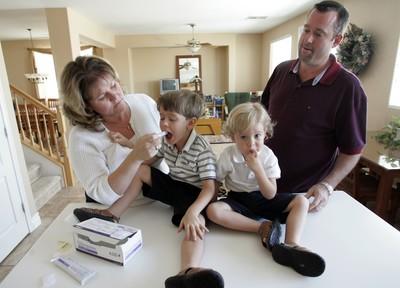Rare disorder limits brothers
Matthew and Andrew Crubaugh seem like ordinary young boys.
They like toy trucks and trains, watching cartoons and playing T-ball with dad.
But life in the family kitchen is anything but ordinary.
Unlike children who turn up their nose to most nutritional foods, Matthew, 4, and Andrew, 2, don't have that luxury. They're allergic, and not just to the usual seafood, peanut or dairy products.
The boys can't eat turkey, chicken, bread, eggs, carrots, ice cream, beef, pork or any products containing wheat.
They can't even eat a Gold Fish cracker without getting a coughing attack or vomiting.
"We try to keep them out of the kitchen,'' said David Crubaugh, the boys' father. "We've removed food from our lives as much as possible, because we know that it can hurt them. They want to eat things but they just can't.''
Andrew and Matthew suffer from a rare disease known as eosinophilic esophagitis, inflammation of the lining in the esophagus. Chronic allergies, such as food allergies, eczema and asthma can trigger the disease, health officials say.
Not much else is known about eosinophilic esophagitis or what causes it.
Most allergists simply recommend sufferers eliminate solid foods from their diet until it is determined which of the edibles is causing the esophagus to inflame.
"You have to start from scratch,'' said Dr. Howard Baron, a Las Vegas pediatric gastroenterologist who earlier this year diagnosed Matthew and Andrew with the disease.
"We had to eliminate everything from their diets and put them on a formula they could drink that contains protein. The protein is completely degraded and broken down so that they do not have a reaction to it.''
Eosinophilic esophagitis affects an estimated 50,000 children and adults in America and can cause abdominal pain and vomiting. It can also lead to underdevelopment of children, according to the American Partnership for Eosinophilic Disorders.
It's a challenge to diagnose because the symptoms -- difficulty swallowing, regurgitation, chest pain, weight loss and nausea -- can be linked to other health problems such as acid reflux disease.
Before they were diagnosed, physicians thought Andrew and Matthew had acid reflux disease. Some thought their symptoms were indicative of asthma or an upper respiratory infection. One physician hinted that Andrew might have a brain tumor, said Susan Crubaugh, the boys' mother.
Andrew, diagnosed earlier this year, has more severe symptoms than Matthew.
They started when he was 8 months old and just introduced to solid foods.
"I'd give him something and, within a few minutes, I was cleaning it up off the floor. He would cough, then vomit,'' his mother said. "He complained of tummy pain. He cried a lot. He couldn't sleep. He was becoming dangerously thin. I was so sad because I knew in my heart that my baby was dying.''
After six months of watching her youngest lose weight, Susan Crubaugh went back to his doctor, showing him pictures. She described him as someone who went from "chubby baby to a gaunt looking baby.''
To rule out acid reflux disease, Andrew's physician ordered a test to measure acid levels in the body. When the test came back negative, there were more tests, including a full-body X-ray to view how Andrew's body processed food. He then underwent an esophagogastroduodenoscopy, or EGD, and a biopsy.
An EGD is a procedure in which a long, flexible tube attached by a light and video camera is slid through the mouth to examine the esophagus, stomach and the first part of the small intestine.
It was during this procedure doctors realized what they were dealing with.
Andrew's esophagus, the muscular tube that propels swallowed food from the mouth into the stomach, was filled with eosinophils. Eosinophils are white blood cells that cause inflammation in the esophagus and are usually the result of someone being exposed to an allergen.
Once Andrew was diagnosed, the Crubaughs had Matthew tested. Though his symptoms weren't as bad, he was diagnosed with the disease as well.
Since Matthew started eating solid foods, he has experienced a dry cough, Susan Crubaugh said. He didn't vomit as much as Andrew, but did have his tonsils and adenoids removed because physicians thought those were the source of his illness.
Baron said the condition is hereditary. The disorder is not widely recognized, because its symptoms overlap with acid reflux disease and because of the increasing rate of food allergies in the United States in the past decade.
It is important the disease is diagnosed and treated early to avoid long-term complications.
Baron said gastrointestinal doctors "work arm-in-arm with allergy docs to find the offending allergens, since the most effective treatment seems to be elimination of the foods causing the problem." He said between 20 and 30 people with the disease live in the Las Vegas Valley.
Susan Crubaugh, a Clark County School District teacher, said she has made contact with three local parents of children with the disease.
"The prognosis is variable, but most patients seem to do well with dietary restrictions,'' Baron said. "There is, however, a significant rate or relapse when trying to reintroduce foods that were previously shown to cause reactions.''
Matthew and Andrew take steroids twice a day to strengthen their esophagus. Both also drink a medical formula as their main meal.
Matthew, who has made some progress, is eating rice products such as rice noodles, rice cereal with rice milk, and bananas, green beans, corn, lamb and buffalo. He can also handle balsamic vinaigrette dressing.
Andrew is strictly on the formula and rice noodles.
"The boys can have sugar, because it doesn't have any food products,'' said Susan Crubaugh.
Aside from restricting food, Baron said, oral or inhaled steroids and antihistamines are available to reduce the esophageal swelling.
Research is under way to understand what causes the disease and how it can be treated, he said.
Some government financial help may be on the way.
The U.S. Senate is expected to vote on a bill which would extend Medicare coverage of nutritional counseling and dietary management to chronic conditions other than just diabetes and renal diseases.
Commercial insurance companies tend to cover what Medicare covers, officials say.
Susan Crubaugh, who will start a support group at Summerlin Hospital this month, said that is important because the formula alone costs about $50 a day.
"We are trying to get awareness out to the public so they can better understand the disease and get diagnosed,'' she said. "Every aspect of our life has been compromised because of this disease. This is a complex disorder with many questions unanswered, because there isn't awareness or research.''


















